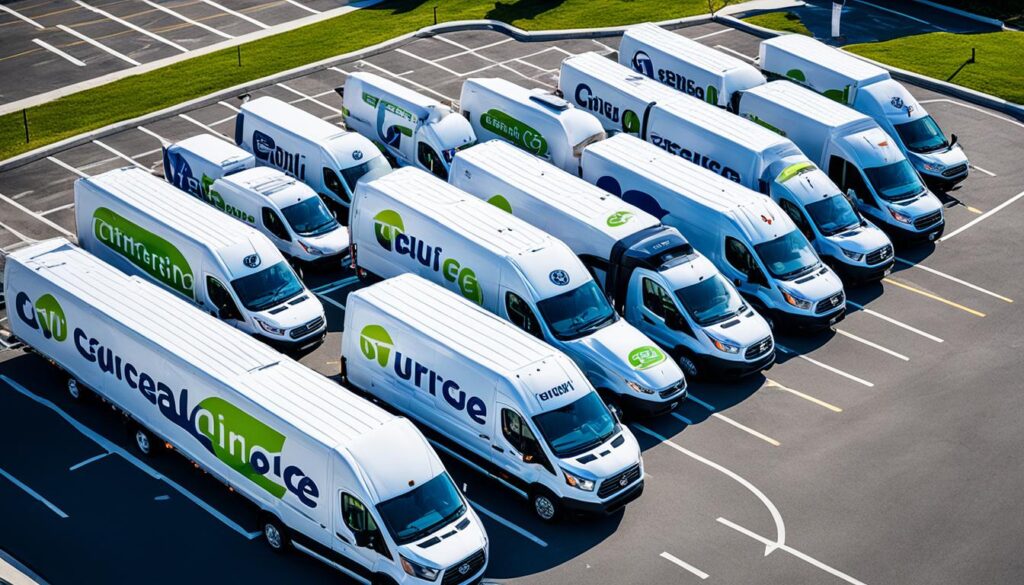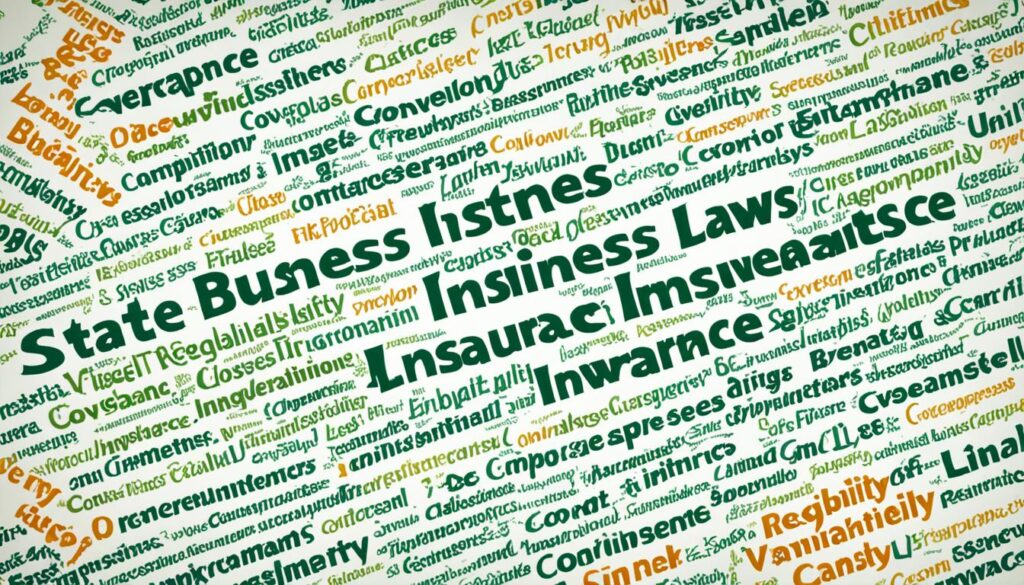As a business owner, it’s crucial to protect your business from the financial risks that come with running a small business. One way to do that is by having the right business insurance coverage in place. Whether you’re just starting out or have been in operation for years, having the appropriate coverage can make all the difference in safeguarding your business.
Key Takeaways
- Business insurance is essential for protecting small businesses from financial risks.
- It provides coverage for property damage, liability claims, and loss of income.
- Understanding the different types of coverage available is crucial for adequate protection.
- Working with an insurance agent can help customize a policy that meets your specific needs.
- Getting a business insurance quote from a reputable provider is a crucial step in securing the right coverage for your business.
Understanding Business Property Coverage
Business property coverage is an essential part of business insurance. It provides protection for a business’s physical assets, such as buildings, furniture, and equipment, from damage or loss caused by various events.
Property damage can occur due to unforeseen circumstances like fire, theft, vandalism, or natural disasters. With commercial property insurance, businesses can recover financially from these incidents and repair or replace damaged property.
When determining the coverage limit, it is crucial to assess the value of the business property accurately. Adequate coverage ensures that the business property is protected and can be restored to its pre-loss condition.
It’s important to note that deductibles play a role in determining the cost of insurance premiums and the out-of-pocket expenses in the event of a claim. Business owners should carefully consider the deductible amount that best suits their budget and risk tolerance.
As a business insurance advocate, XYZ Insurance can guide you in selecting the right commercial property insurance policy tailored to your business needs. Contact us today to discuss your business property coverage options.
The Importance of General Liability Coverage

General liability coverage plays a crucial role in business insurance, providing protection against liability claims arising from bodily injury or property damage caused by a business’s operations. This coverage not only safeguards your business but also helps manage potential financial risks associated with accidents or incidents.
When an unforeseen event occurs, general liability insurance can cover a range of expenses, including medical costs and property repairs. Without proper coverage, these expenses can quickly add up, potentially putting your business at significant financial risk.
One of the key benefits of general liability coverage is its ability to protect your business from the potential financial burden of legal costs. In the event of a liability claim, legal fees can quickly accumulate, making it challenging for a business to cover these expenses without adequate insurance coverage.
It is essential to carefully consider the coverage limit when selecting general liability insurance. The coverage limit determines the maximum amount the insurance company will pay for a claim. Choosing an appropriate coverage limit ensures that your business is adequately protected in the event of a significant liability claim.
By investing in general liability coverage, you can have peace of mind knowing that your business is protected against potential liability claims, and that medical expenses, property repairs, and legal costs will be covered. Take proactive steps to safeguard your business and ensure its long-term success.
“General liability coverage provides vital protection for businesses, shielding them from the financial consequences of liability claims. It is an essential component of comprehensive business insurance.”
Example General Liability Insurance Coverage Limit
Here’s an example table illustrating a general liability insurance coverage limit:
| Coverage Type | Coverage Limit |
|---|---|
| Bodily Injury | $1,000,000 per occurrence |
| Property Damage | $500,000 per occurrence |
| Medical Expenses | $5,000 per person |
| Legal Expenses | Included within coverage limit |
It is crucial to carefully review the coverage limitations and tailor the coverage to your business’s specific needs. Collaborating with an insurance agent who understands your industry can help ensure that you choose the right general liability coverage that supports your business’s unique requirements.
Business Interruption Coverage and Protecting Income

When running a business, unexpected setbacks can happen that disrupt regular operations and result in lost income. This is where business interruption coverage, also known as business income coverage, becomes invaluable. This type of insurance provides financial protection when a covered peril, such as a fire or natural disaster, causes a temporary shutdown or significant decrease in business activity.
One of the main benefits of business interruption coverage is its ability to replace lost income during the restoration period. This means that even if your business is forced to close temporarily due to an insured event, you can still receive a portion of your lost income to help with ongoing expenses like rent, payroll, and utility bills.
It is important to note that business interruption coverage has its limits. The coverage limit is the maximum amount the insurance company will pay out for lost income and ongoing expenses. Therefore, it is crucial for business owners to carefully assess their financial needs and select an appropriate coverage limit to ensure that they have adequate protection in the event of an interruption.
Understanding the Restoration Period
The restoration period is another important factor to consider when it comes to business interruption coverage. This refers to the time it takes for your business to resume normal operations after an insured event. During this restoration period, your insurance policy will typically continue to provide coverage for lost income and ongoing expenses.
However, it is essential to understand the specific terms and conditions of your insurance policy. Some policies may have a specific time limit for the restoration period, while others may base it on the actual time it takes for your business to fully recover. It’s crucial to carefully review your policy to determine the duration of the restoration period and ensure that it aligns with your business’s recovery timeline.
Having business interruption coverage in place can give you peace of mind knowing that your business’s income and ongoing expenses are protected in the event of an interruption. By selecting an appropriate coverage limit and understanding the restoration period, you can ensure that your business is well-prepared to weather unexpected challenges and continue to thrive.
Commercial Auto Insurance for Business Vehicles

If your business relies on vehicles for its operations, it is crucial to have commercial auto insurance in place. This type of insurance provides coverage for liability and property damage caused by accidents involving business-owned vehicles. Whether it’s a delivery van, a company car, or a fleet of trucks, commercial auto insurance ensures that both the vehicles and the people driving them are protected while engaging in business activities.
“Commercial auto insurance not only protects your business from financial loss but also gives you peace of mind knowing that your vehicles and personnel are covered in case of an accident.”
Liability coverage is particularly important when it comes to commercial vehicles. In the event of an accident where your driver is at fault, liability coverage provides financial protection for any claims brought against your business for bodily injury or property damage caused to others. This coverage helps pay for medical expenses, legal fees, and any damages awarded in a lawsuit.
Additionally, commercial auto insurance provides coverage for property damage to your business-owned vehicles. Whether it’s a collision with another vehicle or damage caused by events like theft or vandalism, this coverage helps pay for repairs or replacement of your vehicles, minimizing the financial impact on your business.
It’s important to note that commercial auto insurance coverage can vary depending on the policy. Some policies may include coverage for personal injury protection, uninsured/underinsured motorist incidents, and even reimbursement of rental expenses in case your vehicles are temporarily out of service.
Risk Management and Compliance
Commercial auto insurance not only provides coverage but also plays a key role in managing risk within your business. By implementing safe driving practices, training programs, and fleet management strategies, you can mitigate the chances of accidents and better protect your employees, vehicles, and business as a whole.
Moreover, many states require businesses with vehicles to carry a minimum level of commercial auto insurance to comply with legal obligations. Compliance with these regulations not only protects your business from potential fines and penalties but also ensures that you are taking responsibility for the safety of your employees, other motorists, and the community.
Having the right commercial auto insurance for your business vehicles gives you the confidence to operate efficiently and protect your assets. Whether you’re a sole proprietor with a single vehicle or a large corporation with a fleet, obtaining proper insurance coverage is essential for safeguarding your business.
Additional Business Insurance Coverages to Consider

While a business owner’s policy provides essential coverage for small businesses, there are additional insurance coverages that business owners should consider to protect their assets and mitigate risks. These additional coverages include:
Professional Liability Insurance
Also known as errors and omissions insurance, professional liability insurance provides protection against claims of professional mistakes or negligence. It is especially important for businesses that provide professional services or advice, such as doctors, lawyers, consultants, and architects. Professional liability insurance helps cover legal fees, settlements, and judgments resulting from claims against your business.
Workers’ Compensation Insurance
Workers’ compensation insurance is necessary if your business has employees. It provides benefits for employees who are injured or become ill while performing their job duties. This coverage helps cover medical expenses, rehabilitation costs, lost wages, and disability benefits. Workers’ compensation insurance not only protects your employees but also shields your business from potential lawsuits related to workplace injuries.
Data Breach Insurance
In the digital age, data breaches are a significant concern for businesses. Data breach insurance provides coverage in case of a cyber attack, unauthorized access to customer data, or data loss. This coverage can help cover expenses such as forensic investigations, customer notification, credit monitoring services, and legal fees. Having data breach insurance is essential for businesses that handle sensitive customer information and want to protect their reputation.
Commercial Umbrella Insurance
Commercial umbrella insurance acts as an additional layer of liability coverage. It extends the coverage limits of your underlying liability insurance policies, such as general liability or commercial auto insurance. This type of insurance provides protection against high-value claims that exceed your primary policy limits, giving you peace of mind and financial security in case of a major lawsuit.
By considering these additional insurance coverages, you can ensure comprehensive protection for your business and safeguard it against unforeseen events. Work with an insurance professional to determine the specific coverages that best suit your business’s needs and budget.
Comparison of Additional Business Insurance Coverages
| Insurance Coverage | Key Benefits |
|---|---|
| Professional Liability Insurance | Protection against claims of professional mistakes or negligence |
| Workers’ Compensation Insurance | Coverage for employee injuries or illnesses, including medical expenses and lost wages |
| Data Breach Insurance | Financial protection in case of a cyber attack or data breach |
| Commercial Umbrella Insurance | Extended liability coverage beyond primary policy limits |
Different Types of Insurance Policies for Small Businesses

Small businesses face various risks and uncertainties in their day-to-day operations. To protect themselves from potential financial losses, it’s crucial for these businesses to have the right types of insurance policies in place. Here are some common insurance coverages that small businesses should consider:
1. General Liability Insurance
General liability insurance provides coverage against bodily injury and property damage claims made by third parties. This type of insurance protects small businesses from the costs associated with legal defense, medical expenses, and property repairs.
2. Commercial Property Insurance
Commercial property insurance is designed to protect small businesses from losses or damages to their physical assets, such as buildings, equipment, and inventory. It covers events like fire, theft, vandalism, and natural disasters.
3. Business Income Insurance
Business income insurance, also known as business interruption insurance, provides coverage for lost income and ongoing expenses if a covered event disrupts the normal operations of a small business. It helps ensure that the business can continue operating despite unexpected interruptions.
4. Professional Liability Insurance
Professional liability insurance, also referred to as errors and omissions insurance, is essential for service-oriented businesses. It protects small businesses from claims of negligence, errors, or omissions that result in financial loss for clients or customers.
5. Workers’ Compensation Insurance
Workers’ compensation insurance is required by law in most states and provides coverage for medical expenses and lost wages for employees who are injured or become ill as a result of their work. It helps protect both employees and employers.
6. Data Breach Insurance
Data breach insurance helps small businesses manage the costs associated with data breaches, such as notifying affected customers, providing credit monitoring services, and managing potential legal claims. It safeguards businesses against the financial and reputational damages caused by cyber incidents.
7. Commercial Umbrella Insurance
Commercial umbrella insurance serves as an additional layer of liability coverage on top of the limits provided by other liability policies. It protects small businesses from major liability claims and can help cover the costs that exceed the limits of primary insurance policies.
8. Commercial Auto Insurance
Commercial auto insurance is essential for businesses that use vehicles for their operations. It provides coverage for liability and physical damage to vehicles owned or used by the business. This insurance protects businesses from costs associated with accidents, including property damage and medical expenses.
By understanding these different types of insurance policies, small business owners can make informed decisions about the coverage they need to protect their businesses. Working with an insurance agent can help ensure that policies are customized to fit their specific industry and needs.
Remember, every business is unique, so it’s important to evaluate the risks faced by your own business and consult with an insurance professional to determine which policies are most suitable for your specific situation.
| Insurance Type | Coverage | Benefits | Considerations |
|---|---|---|---|
| General Liability Insurance | Protection against bodily injury and property damage claims | Legal defense, medical expenses, and property repairs | Ensure coverage limit is sufficient for potential claims |
| Commercial Property Insurance | Protection for physical assets, such as buildings and equipment | Coverage for losses caused by fire, theft, and natural disasters | Review deductible and coverage limit to ensure adequate protection |
| Business Income Insurance | Coverage for lost income and ongoing expenses during business interruption | Financial support to help the business recover and resume operations | Consider the restoration period and coverage limit based on business needs |
| Professional Liability Insurance | Protection against claims of negligence or errors in professional services | Coverage for legal defense, settlements, and damages | Ensure the policy covers specific risks associated with the profession |
| Workers’ Compensation Insurance | Medical benefits and lost wages for employees injured on the job | Compliance with state laws and financial protection for employees | Review state-specific requirements and coverage limits |
| Data Breach Insurance | Coverage for costs related to data breaches and cybersecurity incidents | Notification expenses, credit monitoring, legal defense, and settlements | Consider the amount of data held and potential impact of a breach |
| Commercial Umbrella Insurance | Adds extra liability coverage beyond the limits of primary policies | Protection against major liability claims and higher coverage limits | Assess potential risks and coverage gaps to determine appropriate limits |
| Commercial Auto Insurance | Protection for liability and physical damage to business-owned vehicles | Coverage for accidents, property damage, and medical expenses | Consider the number of vehicles and usage patterns to determine coverage |
Compliance with State Business Insurance Laws

Businesses must comply with state business insurance laws to ensure they meet the necessary legal requirements and protect their interests. These laws may vary depending on the state and the industry. It is essential for business owners to familiarize themselves with these regulations to avoid potential legal issues and financial consequences.
One of the common insurance requirements imposed by state laws is workers’ compensation insurance. This coverage is designed to provide benefits to employees who suffer work-related injuries or illnesses. It helps cover medical expenses, lost wages, and rehabilitation costs, ultimately protecting both the business and its workforce.
Another type of insurance often mandated by state laws is professional liability insurance. This coverage is crucial for professionals such as doctors, lawyers, and architects, as it protects them against claims of negligence or errors in their professional services. It provides financial protection for legal expenses and potential damages, giving professionals peace of mind while practicing their expertise.
To navigate through the complexities of state business insurance laws, working with an insurance agent can be highly beneficial. An experienced insurance agent can guide business owners in understanding the specific insurance requirements applicable to their state and industry. They can also assist in finding suitable insurance policies that comply with regulations while also meeting the business’s needs and budget.
Insurance agents have in-depth knowledge of the insurance market and can offer comprehensive advice on coverage options. They can help tailor insurance policies to match the specific risks associated with the business, ensuring adequate protection and compliance with state laws.
By partnering with an insurance agent, business owners can efficiently navigate the complexities of state business insurance laws and secure the necessary coverage to protect their business and assets.
Benefits of Working with an Insurance Agent
An insurance agent provides several advantages:
- Expertise: Insurance agents are well-versed in insurance products and can offer expert advice on selecting the right policy.
- Customization: Insurance agents can customize insurance policies to meet the specific needs and budget of the business.
- Convenience: Working with an insurance agent saves time and effort by streamlining the insurance process.
- Access to multiple carriers: Insurance agents have access to a wide range of insurance carriers, providing business owners with more options to choose from.
- Claims assistance: In the event of a claim, an insurance agent can provide support and guidance throughout the process, ensuring a smooth resolution.
Overall, business owners should prioritize compliance with state business insurance laws to protect their business, employees, and assets. Collaborating with an insurance agent can simplify the process, ensuring that the business meets all necessary requirements and obtains the appropriate coverage.
State Business Insurance Requirements
| State | Workers’ Compensation Insurance | Professional Liability Insurance |
|---|---|---|
| California | Required | Required for certain professions |
| New York | Required | Required for certain professions |
| Texas | Optional, but encouraged | Required for certain professions |
| Florida | Required for construction industry | Required for certain professions |
| Illinois | Required for most businesses | Required for certain professions |
Get the Right Types of Business Insurance

Choosing the right types of business insurance is crucial for protecting your business from a wide range of risks. With the right coverage, you can safeguard your business’s finances and assets, ensuring its long-term stability and success. When it comes to finding the right insurance, partnering with a reputable insurance company can make all the difference.
Working with an experienced insurance company provides you with access to their expertise and knowledge in the industry. They can guide you through the process of identifying the specific insurance needs of your business based on its size, industry, and unique risks. By assessing your business’s vulnerabilities, they can help you customize a policy that addresses those risks effectively.
One of the crucial steps in securing the right coverage for your business is getting a business insurance quote. A business insurance quote provides you with an estimate of the cost and coverage options available to you. It allows you to compare different policies and make an informed decision about the best one for your business.
When requesting a business insurance quote, it’s important to approach reputable insurance providers who have established a strong track record in the industry. Look for an insurance company with a reputation for excellence, reliability, and exceptional customer service. By partnering with a trusted provider, you can have confidence in the accuracy and reliability of the information provided in your business insurance quote.
Benefits of Getting the Right Business Insurance
“The right business insurance coverage gives you peace of mind, knowing that your business is protected from potential financial losses.”
Securing the right types of business insurance offers numerous benefits for your business:
- Financial Protection: Adequate insurance coverage safeguards your business’s finances by covering the costs of property damage, liability claims, and other unforeseen expenses.
- Legal Compliance: Many states require businesses to carry specific types of insurance coverage, such as workers’ compensation insurance. Having the right insurance not only protects your business but also ensures compliance with legal requirements.
- Risk Management: Insurance allows you to manage and mitigate potential risks, providing a safety net for your business in case of unexpected events.
- Business Continuity: With the right insurance coverage, your business can bounce back quickly from unfortunate events, minimizing disruptions and maintaining continuity.
- Reputation Protection: Insurance coverage can help preserve your business’s reputation by covering costs associated with potential liability claims and lawsuits.
Comparison Table: Types of Business Insurance
| Type of Insurance | Coverage | Key Benefits |
|---|---|---|
| General Liability Insurance | Protection against third-party bodily injury, property damage, and advertising injury claims | Covers legal fees, medical expenses, and damages |
| Commercial Property Insurance | Protection for your business property from damage or loss | Covers repair or replacement costs |
| Business Interruption Insurance | Compensation for lost income and ongoing expenses due to a covered event | Ensures business continuity during disruptions |
| Professional Liability Insurance | Protection against claims of professional errors, negligence, or omissions | Covers legal defense costs and damages |
| Workers’ Compensation Insurance | Provides benefits to employees injured on the job | Covers medical expenses, lost wages, and rehabilitation |
| Data Breach Insurance | Protection against the financial and legal consequences of data breaches | Covers notification expenses, legal fees, and regulatory fines |
| Commercial Umbrella Insurance | Additional liability coverage beyond the limits of other policies | Offers extra protection against large liability claims |
| Commercial Auto Insurance | Protection for business-owned vehicles and liability for accidents | Covers damages, medical expenses, and legal costs |
Choosing the right types of business insurance and working with a reputable insurance company ensures that your business receives appropriate coverage. Protecting your business from potential risks and liabilities is an investment that pays off in the long run. Request a business insurance quote today and take the first step towards safeguarding your business’s future.
Also Read : How Does Insurance Help Protect Your Family?
Conclusion
Business insurance is a vital investment for small businesses. It provides protection against financial risks, including property damage, liability claims, loss of income, and more. By understanding the different types of coverage available and working with an insurance agent, business owners can ensure that their business is adequately protected and prepared for any unforeseen events.
With business insurance, owners can safeguard their valuable assets and minimize financial losses in case of property damage or liability claims. It offers peace of mind and allows businesses to focus on their core operations without worrying about potential risks.
If you’re a small business owner, don’t wait to get the right coverage. Contact an insurance agent today to discuss your insurance needs and get a business insurance quote. By taking this step, you’ll be taking proactive measures to protect your business and its future.
FAQs
Q: What is small business insurance?
A: Small business insurance refers to a type of insurance coverage designed specifically for small businesses to help protect them from various risks and liabilities.
Q: How much does business insurance cost?
A: The cost of business insurance can vary depending on factors such as the size of your business, the industry you’re in, the coverage you need, and the insurance company you choose.
Q: What is a business owners policy (BOP)?
A: A business owners policy (BOP) is a type of insurance policy that combines property insurance and general liability insurance into one package, providing comprehensive coverage for small businesses.
Q: How can business insurance help protect your business?
A: Business insurance can help protect your business by providing coverage for various risks such as property damage, liability claims, employee injuries, and more.
Q: How do I know what insurance options are available for my business?
A: The insurance options available for your business can vary based on factors such as your industry, location, and specific needs. It’s best to consult with an insurance agent to explore the insurance products that are suitable for your business.
Q: Why do I need business insurance?
A: You need business insurance to protect your small business from unexpected events, liabilities, and financial losses that could impact your operations and assets.
Q: How can I get a business insurance quote?
A: To get a business insurance quote, you can contact insurance companies directly, work with an insurance agent, or use online tools available on insurance company websites to request a quote tailored to your business needs.
Source Links
- https://www.thehartford.com/business-insurance/types-of-insurance
- https://www.thehartford.com/business-insurance/what-does-business-insurance-cover
- https://www.allstate.com/resources/business-insurance/what-is-small-business-insurance